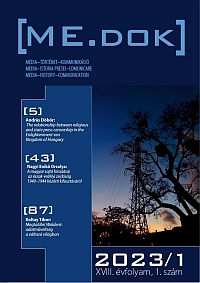The relationship between religious and state press censorship in the Enlightenment-era Kingdom of Hungary
The relationship between religious and state press censorship in the Enlightenment-era Kingdom of Hungary
Author(s): András DöbörSubject(s): Communication studies, History of ideas, Politics and Identity
Published by: Medea Egyesület
Keywords: press history; church censorship; state censorship; Kingdom of Hungary; enlightenment; enlightened absolutism
Summary/Abstract: In my study, I briefly summarize the process, as a result of which church press censorship in the Kingdom of Hungary from the 16th century was transformed into state censorship in the 18th century. Censorship, by controlling the content of written works appearing in print, served the purposes of enlightenment, enlightened absolutism instead of religion, and protected the interests of the ruler who controlled the absolutist state. After the definition of censorship and its historical antecedents in Europe, I present its beginnings in Hungary, during which the Catholic Church and the Protestants exercised control, and the rulers and the parliament fighting for orderly rights tried to create decrees to limit the operation of the press. By the end of the 17th century, overlapping jurisdictions created confusing conditions. Finally, I present the press policy of the enlightened absolutism that abolished church censorship, Maria Theresa’s and Joseph II’s decrees, which opened a new era in Hungarian press history.
Journal: ME.DOK Média-Történet-Kommunikáció
- Issue Year: XVIII/2023
- Issue No: 1
- Page Range: 5-24
- Page Count: 20
- Language: English

